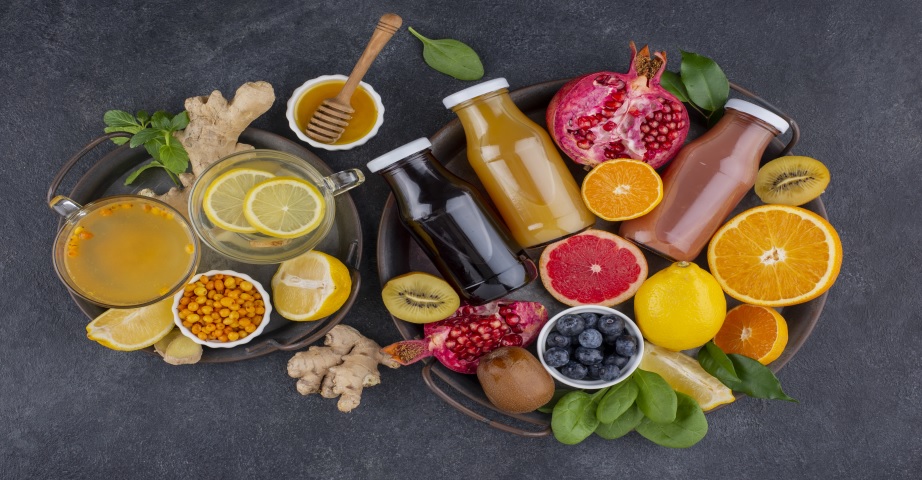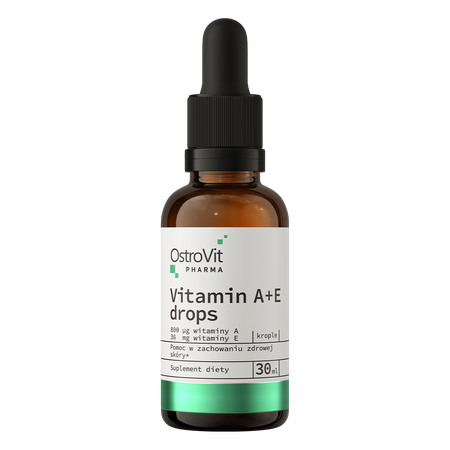Supplements that are worth taking in the autumn and winter

The autumn-winter period is a demanding time for the body - changes in air temperature, sun deficiency, rapid atmospheric phenomena, often result in a deterioration of well-being, a decrease in energy and a decrease in immunity. Natural methods to strengthen the immune system are not always enough - then it may be a good solution to include appropriate dietary supplements for immunity in the menu. What ingredients are worth paying special attention to? Is supplementation in autumn and winter necessary?
Summary
What is immunity?
Immune immunity is, according to the definition, the state of the body's invulnerability to the action of infectious factors. It is the ability to combat pathogenic pathogens and maintain a balance between defence mechanisms.
We can distinguish non-specific or innate immunity, which is based on physical, chemical and cellular barriers, such as sneezing or sweat, as well as specific, also called acquired immunity, which is arisen thanks to vaccines and diseases. Although building immunity is a process that takes many years, it is worth supporting the body using natural methods, as well as vitamins for immunity available on the market.
How to strengthen the body's immunity in the autumn-winter period?
To enjoy good health, you should take care of your immunity throughout the year. The best way to support the body in the daily fight against ubiquitous pathogens is to follow a few basic rules.
One of the important factors determining the proper functioning of the immune system is sleep, or actually adequate sleep hygiene. Every day, you should take care of the night rest, which should last continuously about 7-8 hours. The optimal temperature in the bedroom is also important, which should be about 21 degrees Celsius and reduce the emission of artificial light, in particular blue light, emitted by electronic equipment.
Another extremely important aspect is physical activity - daily movement can reduce the risk of infection, strengthen muscles and the work of individual systems, and can also reduce stress levels and increase the secretion of serotonin, commonly referred to as the hormone of happiness. If we are talking about stress, its limitation also has a positive effect on the body's immunity. This is due to the fact that excessive stress contributes to the chronic production of the stress hormone cortisol. This, in turn, inhibits the action of cells responsible for defending the body against pathogens and contributes to increasing susceptibility to infections.
It is also crucial to maintain health and strengthen immunity to use a properly balanced diet. In the daily menu, vegetables and fruits should be the leader, as well as unprocessed products, such as whole grains products. Complete sources of protein and healthy fats should also be included in the menu. It is worth including to diet also natural probiotics, including pickled foods, as well as products rich in compounds that have a positive effect on the body's immunity, such as honey or garlic.
In addition, it may also be a good solution to include dietary supplements for immunity in the daily menu, which may have a beneficial effect on lymphocyte activity and facilitate the fight against pathogenic pathogens.
Recommended products for immunity
Dietary supplements - what is it?
When considering the use of supplements for immunity, it is worth knowing their definition. So what are dietary supplements? These are foodstuff whose task is to supplement the daily diet with valuable ingredients - vitamins, minerals or other compounds that have a nutritional or other physiological effect. It is worth mentioning that the dietary supplement is not a drug, and is marketed in a form that allows trouble-free dosing - in the form of tablets, capsules, ampoules with liquid, sachets with powder etc.
The dietary supplements are not a panacea for various types of ailments. They are not a magical solution that allows you to maintain full health, despite the use of an incorrect diet, lack of physical activity or the use of drugs. However, they can be a valuable support when supplementing existing deficiencies in the system, and their use should result from the current needs of the body.
Is supplementation in autumn and winter necessary?
The autumn-winter period is a big challenge for the proper functioning of the body, and sudden changes in weather, temperature fluctuations and rapid atmospheric phenomena, promote infections and increase the susceptibility of the body to pathogens, and also weaken the work of the immune system. In addition, the deterioration of mood, associated with a small amount of sun, excess of duties and lack of exercise in the fresh air can intensify stress stimuli and contribute to increasing the level of oxidative stress, which also adversely affects the functioning of the immune system.
And although immunity building is a long-term process that depends in part on genetic determinants, there are ways to support and strengthen the immunity of the body on a daily basis. One of the helpful methods may be the inclusion in the menu of products such as vitamins for the winter and vitamins for the autumn, which can support the proper functioning of the body and the functioning of the immune system.

What supplements for immunity should be taken in the autumn and winter period?
The main purpose of using dietary supplements is to supplement the deficiencies of valuable components in the body. Before starting the use of supplementation, it is worth consulting a doctor and performing appropriate tests that will verify whether it is necessary to use vitamin preparations.
Deficiencies of vitamins and minerals can contribute to dysfunction of the proper functioning of the body and cause the occurrence of undesirable symptoms and ailments, as well as negatively affect well-being or mood. Most often, in the autumn-winter period in society can be observed deficiencies of components such as:
- vitamin D,
- vitamin C,
- zinc,
- vitamin E,
- magnesium,
- omega-3 fatty acids.
Vitamin D
Immunity supplements and pills often contain vitamin D. Deficiencies of the component in the autumn and winter period are a common phenomenon. Although the compound can be supplied to the body with food - fatty fish, marine fish oils, caviar, as well as milk and dairy products are considered sources of vitamin D, the largest amounts of substances are usually delivered to the body along with solar UV radiation, as a result of skin synthesis. Since the exposure time to solar radiation is much shorter in winter, among the people can be observed undesirable symptoms such as increased susceptibility to infections as well as sleep disorders, bone pain and lengthening of the wound healing process, which are the result of too low supply of valuable compound. Since vitamin D affects many processes in the body, including strengthening bones and muscles, supporting the work of the circulatory system or supporting the immune system, it is worth considering the use of dietary supplements containing the ingredient, especially in the autumn-winter period.
Vitamin C
Among the components of vitamins and tablets for immunity, you can often also find vitamin C, which supports the work of the immune system, and taken prophylactically can reduce the frequency of diseases. Due to the fact that vitamin C has antioxidant properties, the compound may also contribute to reducing oxidative stress and slowing down the aging process, and among athletes, it can cause a decrease in cortisol levels and acceleration of regenerative processes. Vitamin C can be supplied to the body primarily along with fresh vegetables and fruits. The compound occurs, among others, in black currant, peppers, citrus fruits or Brussels sprouts, and vitamin C deficiency may contribute to the weakening of blood vessels, muscle pain, as well as a decrease in the overall immunity of the body. Since the variety and availability of fresh vegetables and fruits are significantly reduced in autumn and winter, it may be a good solution to include immunity supplements containing a valuable compound in the menu.
Zinc
Zinc is also an ingredient that is worth paying special attention to in the autumn and winter. It is a compound that not only cares for the proper functioning of the immune system, but also can participate in the synthesis of protein or nucleic acids, and can support the proper development and construction of bones. Zinc can be found in foods such as liver, eggs, buckwheat, or pumpkin seeds, and on cold days, you should also consider using immune vitamins that contain a valuable mineral, deficiency of which may increase susceptibility to bacterial and viral infections, as well as contribute to thyroid dysfunction and deterioration of intellectual performance.
Vitamin E
Vitamin E is another compound that can often be found in immune products, such as vitamins for autumn. It is a fat-soluble ingredient that is found in food, including vegetable oils, cereal seed germ, sprouts or sunflower seeds. Vitamin E has antioxidant properties and thus can reduce oxidative stress and fight free radicals. The compound can also strengthen the walls of blood vessels and delay the aging process. Deficiency of the compound may increase susceptibility to infections, as well as cause irritability and nervousness and deterioration of vision.

Magnesium
Among the vitamins for immunity, you can also find magnesium, which can support muscle work, positively affect memory and concentration, and what's more, can support the functioning of the immune system and enable proper muscle contractility. Deficiency of the compound can cause muscle spasms, eyelid twitching and numbness of the limbs, and can also weaken immunity and contribute to deterioration of well-being. Although magnesium is found in many commonly available foods, such as legumes, cocoa, nuts or buckwheat, there are often deficiencies of the ingredient among the people, therefore, the element can be found among the components of supplements for immunity.
Omega-3 fatty acids
Omega-3 fatty acids, included in the group of polyunsaturated fatty acids, are necessary for the proper functioning of the body, where, among others, they have cardioprotective and hypotensive properties. The compound can also have a beneficial effect on bones and joints, and can strengthen the body's immunity. Omega-3 deficiency can cause muscle spasms and fatigue, and can also increase susceptibility to infections. In food, omega-3 fatty acids are found primarily in fatty marine fish and seafood. Since low fish consumption can be observed in Poland, an insufficient supply of valuable fatty acids along with the menu is a common phenomenon. Therefore, the inclusion in the diet of immune products, such as vitamins for the winter, containing omega-3, may be a good solution to ensure the proper supply of ingredients necessary for the proper functioning of the body.
Supplements for immunity - for who?
The autumn-winter period is a demanding time for both children and adults or seniors. Therefore, dietary supplements for immunity may prove to be a valuable support among all those who are struggling with deficiencies of important ingredients.
Vitamins for immunity for a child usually contain vitamin D, vitamin C and omega-3 fatty acids, while supplements for seniors are also distinguished by the content of valuable minerals or B vitamins. Physically active people often use preparations, which also include elements such as zinc or magnesium.
When considering the use of preparations for immunity, it is worth following the individual needs of the body and the results of medical examinations to supplement only these ingredients, which we are not able to deliver to the system along with the daily menu and a balanced diet.


 OstroVit Vitamin D3 4000 IU + K2 100 tablets
OstroVit Vitamin D3 4000 IU + K2 100 tablets OstroVit Vitamin C 500 g natural
OstroVit Vitamin C 500 g natural OstroVit Zinc Picolinate 150 tablets
OstroVit Zinc Picolinate 150 tablets OstroVit Pharma Vitamin A+E drops 30 ml
OstroVit Pharma Vitamin A+E drops 30 ml OstroVit Magnesium Citrate 400 mg + B6 90 tablets
OstroVit Magnesium Citrate 400 mg + B6 90 tablets OstroVit Omega 3 90 capsules
OstroVit Omega 3 90 capsules